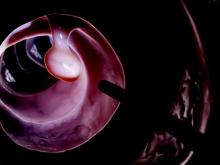Split-dose regimens might be superior for colon cleaning because of the shorter interval between the last preparation product taken and undergoing colonoscopy, said Myriam Martel at McGill University, Montreal, and her associates in a report in the July issue of Gastroenterology (doi:10.1053/j.gastro.2015.04.004).
Repeating a colonoscopy because of inadequate preparation of the colon is expensive. Colon-cleansing preparations include polyethylene glycol (PEG), sodium phosphate, picosulfate, and oral sulfate solutions, the reviewers noted.
To compare the efficacy of split-dose and other schedules and to determine the best products and volumes, they reviewed 47 randomized trials found by systematically searching MEDLINE, EMBASE, Scopus, CENTRAL, and the ISI Web of Knowledge database. The studies were published between 1980 and 2014 and did not include pediatric, hospitalized, or inflammatory bowel disease patients, the reviewers said.
Split-dose preparations provided significantly better colon cleansing than did day-before preparations (odds ratio [OR], 2.51; 95% confidence interval [CI], 1.86-3.39), regardless of whether the day-before preparation was PEG (OR, 2.6; 95% CI, 1.46-4.63), sodium phosphate (OR, 9.34; 95% CI, 2.12-41.11), or picosulfate (OR, 3.54; 95% CI, 1.95-6.45), Ms. Martel and her associates reported.
In the intention-to-treat analysis, the highest volumes of PEG (3 L or more) led to greater bowel cleanliness than did lower split-dose volumes (OR, 1.89; 95% CI, 1.01-3.46). Patients were almost twice as likely to report being willing to repeat split-dose preparations than day-before cleansing, and preferred low-volume preparations over high-volume ones, they said.
Secondary outcomes reported in the 47 trials included side effects, detection of polyps and adenomas, and resumption of daily activities, but definitions of these measures varied too much for the reviewers to reliably compare them. And since other studies are assessing the role of specific diets and adjuvants in colon preparation, they did not include those variables in their analyses.
Ms. Martel and her associates received no funding for the study. One coauthor reported consulting relationships with Pendopharm, Boston Scientific, Olympus Canada, and Cook, and grant funding from Boston Scientific and Cook.



